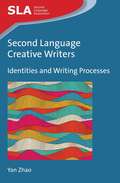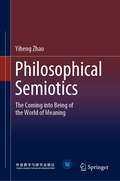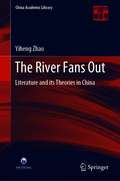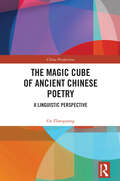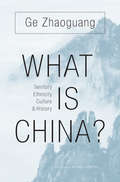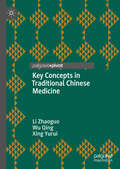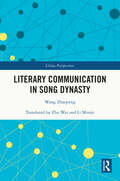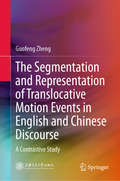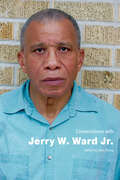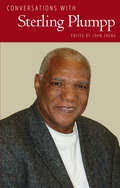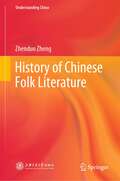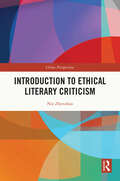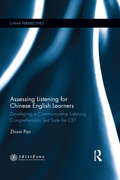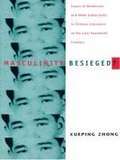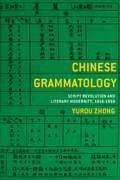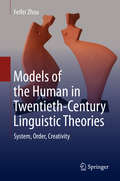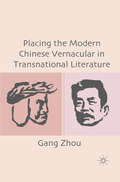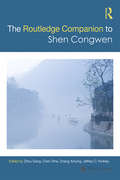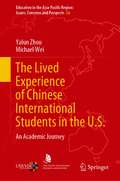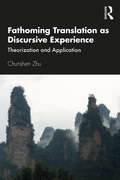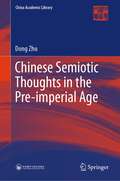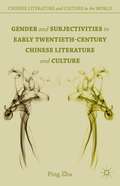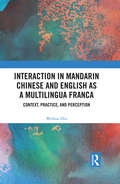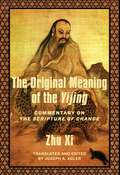- Table View
- List View
Second Language Creative Writers
by Yan ZhaoThis monograph investigates fifteen L2 creative writers' social constructive power in identity constructions. Through interviews and thinkaloud story writing sessions, the central study considers how L2 writer voices are mediated by the writers' autobiographical identities, namely, their sense of selves formulated by their previous language learning and literacy experiences. The inquiry takes the epistemological stance that L2 creative writing is simultaneously a cognitive construct and a social phenomenon and that these two are mutually inclusive. The study contributes to L2 creative writing research and L2 learner identity research and will be of benefit to researchers, language teachers and writing instructors who wish to understand creative writing processes in order to help develop their students' positive selfesteem, confidence, motivation and engagement with the L2.
Philosophical Semiotics: The Coming into Being of the World of Meaning
by Yiheng ZhaoThis book attempts to solve the question whether semiotics is a methodology as is generally held and if the studies of meaning and the mind can shed light on a series of metaphysical issues, so that the edifice of semiotics could be erected on a philosophical ground. It proposes that a philosophical semiotics is, by necessity, a semiotic phenomenology about the construction of the “world of meaning” by signs, and any discussion about semiotics has to proceed around two core issues: meaning and the mind.This book particularly exemplifies the semiotic connections in various schools of traditional Chinese philosophies. In the “Pre-Imperial Age” (before BC 300), there emerged an abundance of semiotic thinking in China, from Yijing the first sign system that aims to explain everything in the world, to the Namists’s subtle argument about the form of meaning, from the Yin-Yang/five elements of the Han, to the “Things are non-existent while mind is non-non-existent” principle of the Vijñāptimātratāsiddhi School of Buddhism in the Tang, and from the Sudden Revelation of Chan Buddhism to the “Nothing outside the mind” endorsed by the Mindist Confucianism in the Ming. The mighty trend of philosophical heritage provides rich food to our understanding of the form of meaning.
The River Fans Out: Literature and its Theories in China (China Academic Library)
by Yiheng ZhaoThis book presents 18 highly influential essays on Chinese literature and semiotics by Professor Zhao Yiheng, including his analysis and discussions of the development of Chinese literature and its characteristics from traditional to modern times. It is divided into three parts: traditional Chinese literature, contemporary Chinese literature, and semiotics. In the first part, Professor Zhao summarizes the core elements of narrative cultural relations, ethical dilemmas, and narrative features. He also provides a comprehensive description of the formal structures in Chinese traditional literature. Taking the traditional Chinese play White Rabbit as a case, he discusses the connections between the narrative structure and the characteristics of Chinese novels and stratification of Chinese culture.
The Magic Cube of Ancient Chinese Poetry: A Linguistic Perspective (China Perspectives)
by Ge ZhaoguangThis book focuses on the linguistic perspective of classical Chinese poetry and its changes and development in diff erent historical periods. It off ers a combination of theoretical analysis and aesthetic appreciation of exemplary poems. The author discusses the following aspects of classical Chinese poetry: the relationships between background and meaning in the interpretation of a poem; how readers can deal with the tangle of linguistic approach and intuitive perception in interpreting poems; the engagement and disengagement of the poet’s thought fl ow with and from the word order of the verse; the tonal and metrical schemes; and the three special features of classical Chinese poetry: the signifi cance and role of allusions, “Xu Zi”, and “Shi Yan”. Last, the author analyses the development of Chinese poetry from the Vernacular Song Dynasty Style to the Vernacular Modern Style. It will be a great read for students and scholars of East Asian studies, Chinese studies, linguistics, and those interested in Chinese poetry in general. The book aims to lead readers to discover a fresh and amazing world of classical Chinese poetry, a fantastic panoramic picture of its beauty and charm, and a poetic feast that the reader may not otherwise be privileged to enjoy.
What Is China?: Territory, Ethnicity, Culture, and History
by Ge ZhaoguangGe Zhaoguang, an eminent historian of traditional China and a public intellectual, takes on fundamental questions that shape the domestic and international politics of the world’s most populous country and its second largest economy. What Is China? offers an insider’s account that addresses sensitive problems of Chinese identity and shows how modern scholarship about China—whether conducted in China, East Asia, or the West—has attempted to make sense of the country’s shifting territorial boundaries and its diversity of ethnic groups and cultures. Ge considers, for example, the ancient concept of tianxia, or All-Under-Heaven, which assigned supremacy to the imperial court and lesser status to officials, citizens, tributary states, and tribal peoples. Does China’s government still operate with a belief in divine rule of All-Under-Heaven, or has it taken a different view of other actors, inside and outside its current borders? Responding both to Western theories of the nation-state and to Chinese intellectuals eager to promote “national learning,” Ge offers an insightful and erudite account of how China sees its place in the world. As he wrestles with complex historical and cultural forces guiding the inner workings of an often misunderstood nation, Ge also teases out many nuances of China’s encounter with the contemporary world, using China’s past to explain aspects of its present and to provide insight into various paths the nation might follow as the twenty-first century unfolds.
Key Concepts in Traditional Chinese Medicine
by Li Zhaoguo Wu Qing Xing YuruiThis book offers a comprehensive overview of Chinese medicine terminology translation, defining the most central concepts in Chinese traditional medicine, providing simplified Chinese characters, Mandarin Pronunciation in pinyin, citations for 111 of the most key concepts in traditional Chinese medicine and culture. Covering definitions of terms relating to essence, qi, yin-yang theory, five elements and visceral manifestation in traditional medicine, it offers a selection of English versions of each term in addition to a standard English version, drawing on the translation history of traditional Chinese medicine. It provides a useful resource to understand the fundamental terms of traditional Chinese medicine and culture in Chinese and English, and their relevance to cross-cultural discourse.
Literary Communication in Song Dynasty (ISSN)
by Wang ZhaopengBased on first-hand historical materials, this book explores the various aspects of literary communication during the Song Dynasty in China.The book investigates the single-channel dissemination of poetry and ci works, the dissemination of literary collections, the dissemination through wall inscriptions, the oral dissemination of Song ci, the remuneration and commercialization of literature in the Song Dynasty, the paths to fame for Song writers, the non-literary factors in the dissemination of literature and the dissemination of literary works through paintings and songs. The author provides insights into the six major questions in the study of literary communication: Who disseminates, where, how, what, to whom and the effects of dissemination. The author also seeks to provide detailed answers to the following questions. What was the role of female singers in both domestic and official entertainment? What were the costs and prices of the books? Who paid the authors? What methods did writers use to gain fame and social recognition?This work will be essential reading for scholars and students of Chinese studies, communication studies and media and cultural studies.
The Segmentation and Representation of Translocative Motion Events in English and Chinese Discourse: A Contrastive Study
by Guofeng ZhengThis book provides a systematic, contrastive analysis of the segmentation and representation of English and Chinese Translocative Motion Events (TMEs), which possess Macro-Event Property (MEP). It addresses all the issues critical to understanding TMEs in English and Chinese, from event segmentation, MEP principles and the conceptual structure of TMEs and their constituents, to the representation of Actant, Motion, Path and Ground. The book argues that the corpus-based alignment for the TME segmentation in both languages, the parameters of Actant, Motion, Path and Ground and their relevant statistical description are particularly important for understanding English and Chinese TMEs. The linguistic materialization of Actant, Ground, Path and Motion, together with a wealth of tables and figures, offers convincing evidence to support the typological classification of English and Chinese. The book’s suggestions regarding the Talmyan bipartite typology and Bohnemeyer’s MEP contribute to the advancement of TME studies and language typology, and help learners to understand motion events and English-Chinese typological similarities and differences.
Conversations with Dana Gioia (Literary Conversations Series)
by John ZhengConversations with Dana Gioia is the first collection of interviews with the internationally known poet and public intellectual, covering every stage of his busy, polymathic career. Dana Gioia (b. 1950) has made many contributions to contemporary American literature and culture, including but not limited to crafting a personal poetic style suited to the age; leading the revival of rhyme, meter, and narrative through New Formalism; walloping the “intellectual ghetto” of American poetry through his epochal article “Can Poetry Matter?”; helping American poetry move forward by organizing influential conferences; providing public service and initiating nationwide arts projects such as Poetry Out Loud through his leadership of the National Endowment for the Arts; and editing twenty best-selling literary anthologies widely used in American classrooms. Taken together, the twenty-two collected interviews increase our understanding of Gioia’s poetry and poetics, offer aesthetic pleasure in themselves, and provide a personal encounter with a writer who has made poetry matter. The book presents the actual voice of Dana Gioia, who speaks of his personal and creative life and articulates his unique vision of American culture and poetry.
Conversations with Jerry W. Ward Jr. (Literary Conversations Series)
by John ZhengJerry W. Ward Jr. (b. 1943) has published nonfiction, literary criticism, encyclopedias, anthologies, and poetry. Ward is also a highly respected scholar with a specialty in African American literature and has been recognized internationally as one of the leading experts on Richard Wright. Ward was Lawrence Durgin Professor of Literature at Tougaloo College, served as a member of both the Mississippi Humanities Council and the Mississippi Advisory Committee for the US Commission on Civil Rights, and cofounded the Richard Wright Circle and the Richard Wright Newsletter. He has won numerous awards, and in 2001 he was inducted into the International Literary Hall of Fame for Writers of African Descent. Conversations with Jerry W. Ward Jr. aims to add an indispensable source to American literature and African American studies. It offers an account of Ward's intelligent and thoughtful responses to questions about literature, literary criticism, teaching, writing, civil rights, Black aesthetics, race, and culture. Throughout the fourteen interviews collected in this volume that range from 1995 to 2021, Ward demonstrates his responsibilities as a contemporary scholar, professor, writer, and social critic. His charming personality glimmers through these interviews, which, in a sense, are inner views that allow us to see into his mind, understand his heart, and appreciate his wit.
Conversations with Sterling Plumpp (Literary Conversations Series)
by John ZhengConversations with Sterling Plumpp is the first collection of interviews with the renowned poet of Home/Bass and other much-admired works. Spanning thirty years and drawn from literary and scholarly journals and other media, these interviews offer insights into his poetic innovation of blues and jazz and his mastery of black vernacular in poetry. This collection seems fundamental to an understanding of the life and work of an African American poet who has been innovative in fusing blues and jazz rhythms with poetic insight and in vivifying the vernacular landscape of African American poetry.Born in 1940 in Clinton, Mississippi, Plumpp has been living in Chicago since 1962. Home/Bass received the 2014 American Book Award. The finest blues poet of his generation, Plumpp became a model for contemporary poetry and poetics and a leading figure in the tradition of blues/jazz poetry. He continues to reinvent the language while exploring the registers of individual and communal memory and of local, national, and global history. His poetry is important in attempts to define the black aesthetic from the era of the Harlem Renaissance to the seminal Black Arts Movement. It is also important for its re-articulation of the Great Migration, especially expressed by blues musicians who left Mississippi for Chicago.
History of Chinese Folk Literature (Understanding China)
by Zhenduo ZhengThis book mainly addresses the position, function, influence, and values of folk oral literature in the history of Chinese literature. Divided into 14 chapters, it systematically covers central aspects of folklore literature such as ballads, folk songs, Bianwen, Zajuci, Guzici, Zhugongdiao, Sanqu, Baojuan, Tanci, Zidishu, and so on from the Pre-Qin to the late Qing Dynasties, filling several gaps in literary history studies. It is a comprehensive literary work, and many of the materials cited here are rare and difficult to find. In addition, the book proposes some important theories, especially six highly generalized qualities of folk literature, namely that it is: popular, collective, oral, fresh, effusive, and innovative.With detailed, extensive materials, and quotations, the book represents the most systematic and comprehensive work to date on ancient Chinese folk literature. It is mutually complementary with Guowei Wang’s A Textual Research of the Traditional Chinese Opera in the Song and Yuan Dynasties and Xun Lu’s A Brief History of Chinese Fiction; all three works are regarded as the most essential classics for researching the history of Chinese literature.
Introduction to Ethical Literary Criticism (China Perspectives)
by Nie ZhenzhaoThis title is a thorough introduction to ethical literary criticism, defined as a critical methodology to interpret literature from the perspective of ethics, with the whole set of concepts and theories elucidated and textual analyses provided. While building on ideas from both western ethical criticism and the Chinese tradition of moral criticism, ethical literary criticism acts as a counterpoint to the former's lack of theoretical foundations and applicable methodologies and the latter's tendency to make subjective moral judgments. Developed into a coherent theoretical framework, it asserts the ethical nature and edifying function of literature and thereby seeks to highlight in the literary text the ethical relationship and moral order among human beings and within society in the historical context. Though provocative to a degree, the arguments and methodological toolbox used inject a unique ethical dimension into literary criticism and will help readers understand anew the ethical and social potency of literature. The book's theoretical elucidation, examples from practical criticism and introduction to key terminologies make this book an essential guide for students and general readers interested in ethical literary criticism and a valuable read for scholars of literary criticism, ethical criticism and literary theory.
Assessing Listening for Chinese English Learners: Developing a Communicative Listening Comprehension Test Suite for CET (China Perspectives)
by Pan ZhixinThis book reports in detail the newly developed Communicative Listening Comprehension Test (CLCT) for the National College English Test (CET) of China. Following the principles of communicative testing in general and test construction approach proposed by Bachman and Palmer (1996) in particular, the project develops CLCT for CET-4 and CET-6. The research begins with the construction of frameworks of listening task characteristics and communicative listening ability. Subsequently, based on a survey of Chinese college students' English listening needs and an analysis of listening tasks in influential English listening course books and public tests, CLCT-4 and CLCT-6 test specifications are developed. Finally, sample papers are produced and a series of posteriori studies are conducted to examine the difficulty and usefulness of the newly developed notes-completion task type in two CLCT tests. As an example of successful integration of communicative testing theories and test construction practice, this research provides valuable insights into listening test development for other large-scale tests.
Masculinity Besieged?: Issues of Modernity and Male Subjectivity in Chinese Literature of the Late Twentieth Century
by Xueping ZhongIn Masculinity Besieged? Xueping Zhong looks at Chinese literature and films produced during the 1980s to examine male subjectivities in contemporary China. Reading through a feminist psychoanalytic lens, Zhong argues that understanding the nature of male subjectivities as portrayed in literature and film is crucial to understanding China's ongoing quest for modernity. Before the 1990s onslaught of popular culture decentered the role of intellectuals within the nation, they had come to embody Chinese masculinity during the previous decade. The focus on masculinity in literature had become unprecedented in scale and the desire for "real men" began to permeate Chinese popular culture, making icons out of Rambo and Takakura Ken. Stories by Zhang Xianliang and Liu Heng portraying male anxiety about masculine sexuality are employed by Zhong to show how "marginal" males negotiate their sexual identities in relation to both women and the state. Looking at writers popular among not only the well-educated but also the working and middle classes, she discusses works by Han Shaogong, Yu Hua, and Wang Shuo and examines instances of self-loathing male voices, particularly as they are articulated in Mo Yan's well-known work Red Sorghum. In her last chapter Zhong examines "roots literature," which speaks of the desire to create strong men as a part of the effort to create a geopolitically strong Chinese nation. In an afterword, Zhong situates her study in the context of the 1990s. This book will be welcomed by scholars of Chinese cultural studies, as well as in literary and gender studies.
Chinese Grammatology: Script Revolution and Literary Modernity, 1916–1958
by Yurou ZhongToday, Chinese characters are described as a national treasure, the core of the nation’s civilizational identity. Yet for nearly half of the twentieth century, reformers waged war on the Chinese script. They declared it an archaic hindrance to modernization, portraying the ancient system of writing as a roadblock to literacy and therefore science and democracy. Movements spanning the political spectrum proposed abandonment of characters and alphabetization of Chinese writing, although in the end the Communist Party opted for character simplification.Chinese Grammatology traces the origins, transmutations, and containment of this script revolution to provide a groundbreaking account of its formative effects on Chinese literature and culture, and lasting implications for the encounter between the alphabetic and nonalphabet worlds. Yurou Zhong explores the growth of competing Romanization and Latinization movements aligned with the clashing Nationalists and Communists. She finds surprising affinities between alphabetic reform and modern Chinese literary movements and examines the politics of literacy programs and mass education against the backdrop of war and revolution. Zhong places the Chinese script revolution in the global context of a phonocentric dominance that privileges phonetic writing, contending that the eventual retention of characters constituted an anti-ethnocentric, anti-imperial critique that coincided with postwar decolonization movements and predated the emergence of Deconstructionism. By revealing the consequences of one of the biggest linguistic experiments in history, Chinese Grammatology provides an ambitious rethinking of the origins of Chinese literary modernity and the politics of the science of writing.
Models of the Human in Twentieth-Century Linguistic Theories: System, Order, Creativity
by Feifei ZhouThis book provides a refreshingly new perspective for investigating linguistic texts, which foregrounds models of the human. It presents a close reading of major linguistic theories in the twentieth century with a focus on three main themes: linguistic system and the individual speaker; social order; and linguistic creativity. The examination of these three fundamental themes concerning language and human nature, on the one hand, provides a fine-textured exposition on the implicit and explicit models of human nature endorsed by major theorists; on the other, it reveals the methodological dilemmas faced by linguistics. In light of the fact that the importance of considering posthumanist ideas is increasingly being underscored today, both within and outside linguistics, this focus on the human makes the book highly topical.
Placing the Modern Chinese Vernacular in Transnational Literature
by Gang ZhouThis is the first book to concentrate not only on the triumph of the vernacular in modern China but also on the critical role of the rise of the vernacular in world literature, invoking parallel cases from countries throughout Europe and Asia.
Routledge Companion to Shen Congwen (Chinese Literature Series from a Global Perspective)
by Gang Zhou Sihe Chen Zhang Xinying Jeffrey C KinkleyThis volume is about studies of Shen Congwen (1902–1988), one of the most important writers in modern China, but more importantly, it is about how Shen Congwen has been received in and beyond Mainland China. By presenting the best literary criticism on Shen Congwen in Mainland China over the past 80 years, and views of how Shen Congwen has been understood, interpreted, and appreciated in Japan, the US, and Europe, the editors propose a new way to approach the topics of canonic writers, modern Chinese literature, and world literature. <P><P> This is itself a translated project. Its Chinese edition appeared in May 2017. The bilingual rendering of the best criticism of Shen Congwen from a global perspective intends to initiate and advance dialogues between Chinese- and English- language scholarly communities. We strive to explore the complexities of “worldwide” images and interpretations of Shen Congwen. By calling attention to the foreign spaces into which overseas Shen Congwens and modern Chinese literature are reborn as world literature, we acknowledge and celebrate the study of Shen Congwen and modern Chinese literature as ongoing and endless cross-cultural dialogues and manifestations.
The Lived Experience of Chinese International Students in the U.S.: An Academic Journey (Education in the Asia-Pacific Region: Issues, Concerns and Prospects #56)
by Yalun Zhou Michael WeiThis book marks a departure from traditional assumptions concerning the deficiencies of Chinese international students in terms of learning and adapting. It employs phenomenological narrative inquiry and a small culture approach to investigate the evolved, fluid experience of pursuing a graduate degree in the U.S. at Blue Fountain University (a pseudonym for a mid-western university).Adopting an interdisciplinary perspective, this book addresses two fundamental questions: What study abroad is and what study abroad counts? The sociocultural dimensions that shape the cross-border degree seeking endeavors inform stakeholders what works for Chinese international students’ successful pursuits as EFL learners and ESL users and what could be improved. This book shares thoughts on the implications and impact of educational contexts to stakeholders at normal and dynamic contexts interrupted by global pandemic outbreak. It contributes to the understanding of the internationalization of the host institute and the EFL education reform efforts (policy making, teacher education, and classroom practice) in China (and in Asia at large).
Fathoming Translation as Discursive Experience: Theorization and Application
by Chunshen ZhuIn his positive approach to translation studies featured in this highly original volume, Chunshen Zhu brings into perspective from the vantage point of translation the workings of human factors in text production, interpretation, and dissemination in and through translation in varying social situations. This book examines a variety of key issues heatedly debated or largely neglected in the field of translation studies and beyond, for example, meaning making, nature of the Unit of Translation, augmentation of transitivity by modification, signification of repetition, and cognitive effects of syntactic iconicity, by critically engaging insights from functional linguistics and philosophy of language, among other fields of study. These issue-driven, phenomenon-focused, and theorization-oriented studies, presented in eight chapters with ample exemplification and case studies, form a coherent whole to bring a network of correlations between theory and practice, linguistics and literature, form and content, information structure and communicative function, intention and effect, and textuality and experience to bear upon the study of translation, fathoming its depths not only as a linguistic operation but more significantly as a textually accountable process of intersubjective and cross-lingual sign making that facilitates humans’ understanding of themselves and of the world. The book is therefore a useful reference for scholars, teachers, and postgraduate and research students who are interested in a comprehensive yet focused approach to translation as an academic subject straddling linguistics and literary, cultural, and social studies, as well as for those who would like to observe bilingualism and cross-cultural communication through translation in general and translation involving the Chinese language in particular.
Chinese Semiotic Thoughts in the Pre-imperial Age (China Academic Library)
by Dong ZhuThis book examines practices on the relationship between sign and meaning in the Pre-Imperial period of China from the semiotics perspective. Although the Chinese civilization did not develop a comprehensive semiotics system in that period, they are highly semiotic in many ways. The thinking and application of signs of Chinese people can be found in many classics, such as The Book of Changes, The Analects of Confucius, Tao De Jing and Zhuangzi. This book begins its study by re-examining the semiotic thoughts contained in The Book of Changes and inquiries into the thoughts of the major philosophers of different schools. It provides insights into the findings of these philosophers concerning the relationship between sign and meaning. In particular, it concentrates on how the prosperity of the various contending semiotic thoughts complemented each other in forming a sign system. In addition, the book also emphasizes the wholeness and associativity of observing things and studying relevant signs of Chinese people. As the first monograph in any language to systematically summarize Chinese semiotic thought in the Pre-Imperial period, this book helps promote understanding of the traditional Chinese culture and mindset.
Gender and Subjectivities in Early Twentieth-Century Chinese Literature and Culture
by Ping ZhuGender and Subjectivities in Early Twentieth-Century Chinese Literature and Culture offers an in-depth study on how late Qing and modern Chinese intellectuals used gender as a discursive battlefield to demand power vis-#65533;-vis colonial discourses. Through a combination of cultural analysis and literary analysis, including discussions of modern Chinese writers such as Lu Xun, Yu Dafu, Zhang Ziping, Guo Moruo, Mu Shiying, Liu Na'ou, Bai Wei, and Ding Ling, Ping Zhu shows the resilience andmalleability of Chinese modernity via a femininity imagined an empowered and empowering. By focusing on 'the feminine at large,' this book draws a contrasting image of the docile, contained feminine in colonial gender ideology to provide one salient example of China's politics of resistance.
Interaction in Mandarin Chinese and English as a Multilingua Franca: Context, Practice, and Perception
by Weihua ZhuInteraction in Mandarin Chinese and English as a Multilingua Franca: Context, Practice, and Perception proposes a model of context, practice, and perception and raises awareness of the importance of understanding language use and perception in context in order to avoid intercultural communication misunderstandings. This book provides an overview of previous research on the pragmatics of Chinese and English as a multilingua franca in multilingual contexts. It argues that context is socioculturally shaped, interactionally constructed, and personally related. Context can influence and be established by the practice and perception of communicative acts. This book also combines the proposed model with the discursive-interactional approach to uncover the interplay of context, practice, and perception of extended concurrent speech for strong disagreement by native Chinese speakers in spontaneous conversations in Mandarin and English as a multilingua franca.
The Original Meaning of the Yijing: Commentary on the Scripture of Change (Translations from the Asian Classics)
by Xi ZhuThe Yijing (I Ching), or Scripture of Change, is traditionally considered the first and most profound of the Chinese classics. Originally a divination manual based on trigrams and hexagrams, by the beginning of the first millennium it had acquired written explanations and a series of appendices attributed to Confucius, which transformed it into a work of wisdom literature as well as divination. Over the centuries, hundreds of commentaries were written on it, but for the past thousand years, one of the most influential has been that of Zhu Xi (1130–1200), who synthesized the major interpretive approaches to the text and integrated it into his system of moral self-cultivation.Joseph A. Adler’s translation of the Yijing includes for the first time in English Zhu Xi’s commentary in full. Adler explores Zhu Xi’s interpretation of the text and situates it in the context of his overall theoretical system. Zhu Xi held that the Yijing was originally composed for the purpose of divination by the mythic sage Fuxi, who intended to create a system to aid decision making. The text’s meaning, therefore, could not be captured by a single commentator; it would emerge for each person through the process of divination. This translation makes available to the English-language audience a crucial text in the history of Chinese religion and philosophy, with an introduction and translator’s notes that explain its intellectual and historical context.
